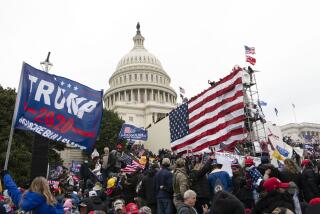What Subpoena? Immunity May Open a New Legal Path for Clinton
- Share via
Now that Monica Lewinsky has been given transactional--that is, complete--immunity, she is no longer the target of Kenneth Starr’s grand jury. The remaining target is President Clinton. We are now confronted therefore with the great constitutional question of whether a sitting president can be indicted by a grand jury and tried by a petit jury in a criminal court or whether the only recourse is impeachment by the House and trial by the Senate.
The reason this question has now become so important is that the only proper function for a grand jury is to gather and consider evidence leading toward a criminal indictment or refusal to indict. It is absolutely improper for an independent counsel or any other prosecutor to use the grand jury process--subpoenas, interrogations outside the presence of counsel and sworn testimony--in order to obtain evidence to turn over to Congress for purposes of considering impeachment. Separation of powers requires that Congress must use its own processes for obtaining evidence leading to impeachment. Congress may not use the courts or the grand jury for this purpose, nor may the court and grand jury be used by an independent counsel for this purpose. Even if Congress could constitutionally authorize the use of a grand jury to gather evidence for impeachment, it has not explicitly done so.
For these reasons, therefore, the president should challenge the subpoena he recently received from Starr’s grand jury on the ground that he is not properly the target of a grand jury proceeding, since a sitting president cannot be indicted. This challenge would force Starr to state his position on whether the president can be indicted, a position that thus far he has refused to state with any clarity.
The stage would thus be set for a great and important decision by the U.S. Supreme Court as to whether a sitting president can be indicted and criminally tried. If the answer to that question is no, then it should follow that the president’s grand jury subpoena must be quashed. If the answer to that question is yes, then the president must respond to the subpoena, but he is free to invoke his privilege against self-incrimination.
If the president may not be indicted by a grand jury and tried in a criminal court, it is somewhat questionable whether he could invoke any privilege against self-incrimination. The answer to that question would turn on whether impeachment is a criminal proceeding. If it is not--as other punitive proceedings such as deportation, disbarment and bankruptcy are not--then the president could not refuse to answer questions on the ground that his testimony might lead to impeachment or removal. If Starr claims that the target is not the president but others, such as Vernon Jordan or Bruce Lindsey, then the president may be able to limit his testimony to what he knows about them.
Without having the answer to these questions, it would be difficult for the president’s lawyers to give him sound advice as to how he should proceed in the face of a grand jury subpoena. It seems clear that Lewinsky will now testify that the president committed perjury in his Paula Jones deposition when he denied that he engaged in a sexual relationship with Lewinsky. According to press reports, the definition of sexual relationship given the president before he testified was inclusive enough to cover the kind of sexual contact that Lewinsky will swear she engaged in with the president.
Thus if the president was forced to testify and were to repeat his sworn statement, he would find himself in a swearing contest with Lewinsky. Nor could the president be sure whether Lewinsky may have some corroboration of her testimony, unless of course the president was telling the truth at his Jones deposition.
But even if he did testify truthfully, his lawyers will not want to put him into a swearing contest before a grand jury. It is one thing to be accused of stretching the truth about a marginally relevant fact in a deposition in a civil case that has been dismissed, as has Jones’ harassment lawsuit. It is quite another thing to be accused of committing perjury in front of a grand jury.
The president’s lawyers should do everything in their power to prevent the president from getting into a swearing contest with Lewinsky in front of a grand jury. By giving Lewinsky complete immunity from prosecution--and eliminating her as a grand jury target--Starr may have given the president’s lawyers a powerful weapon with which to challenge his grand jury subpoena.
More to Read
Get the L.A. Times Politics newsletter
Deeply reported insights into legislation, politics and policy from Sacramento, Washington and beyond. In your inbox twice per week.
You may occasionally receive promotional content from the Los Angeles Times.










